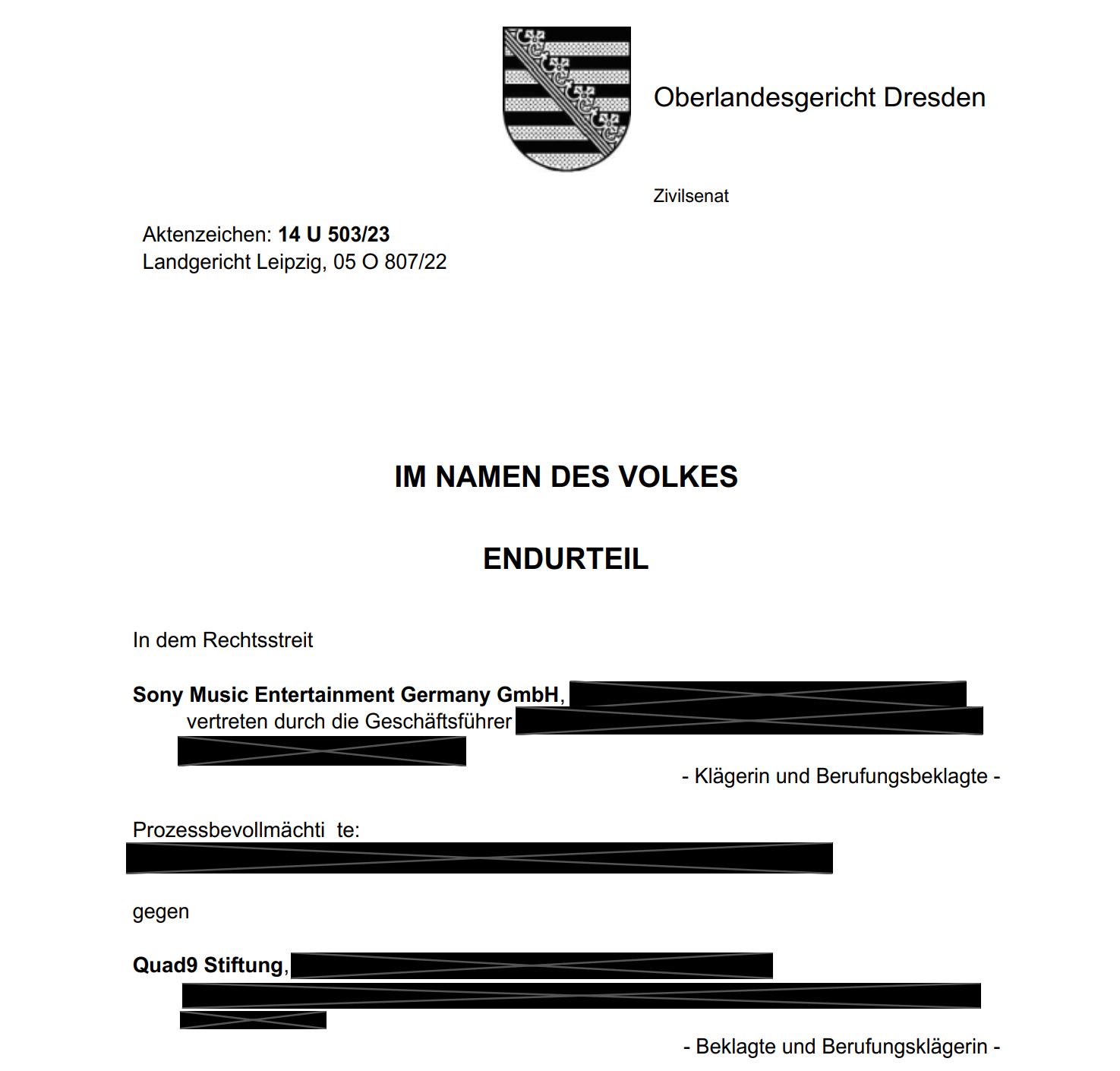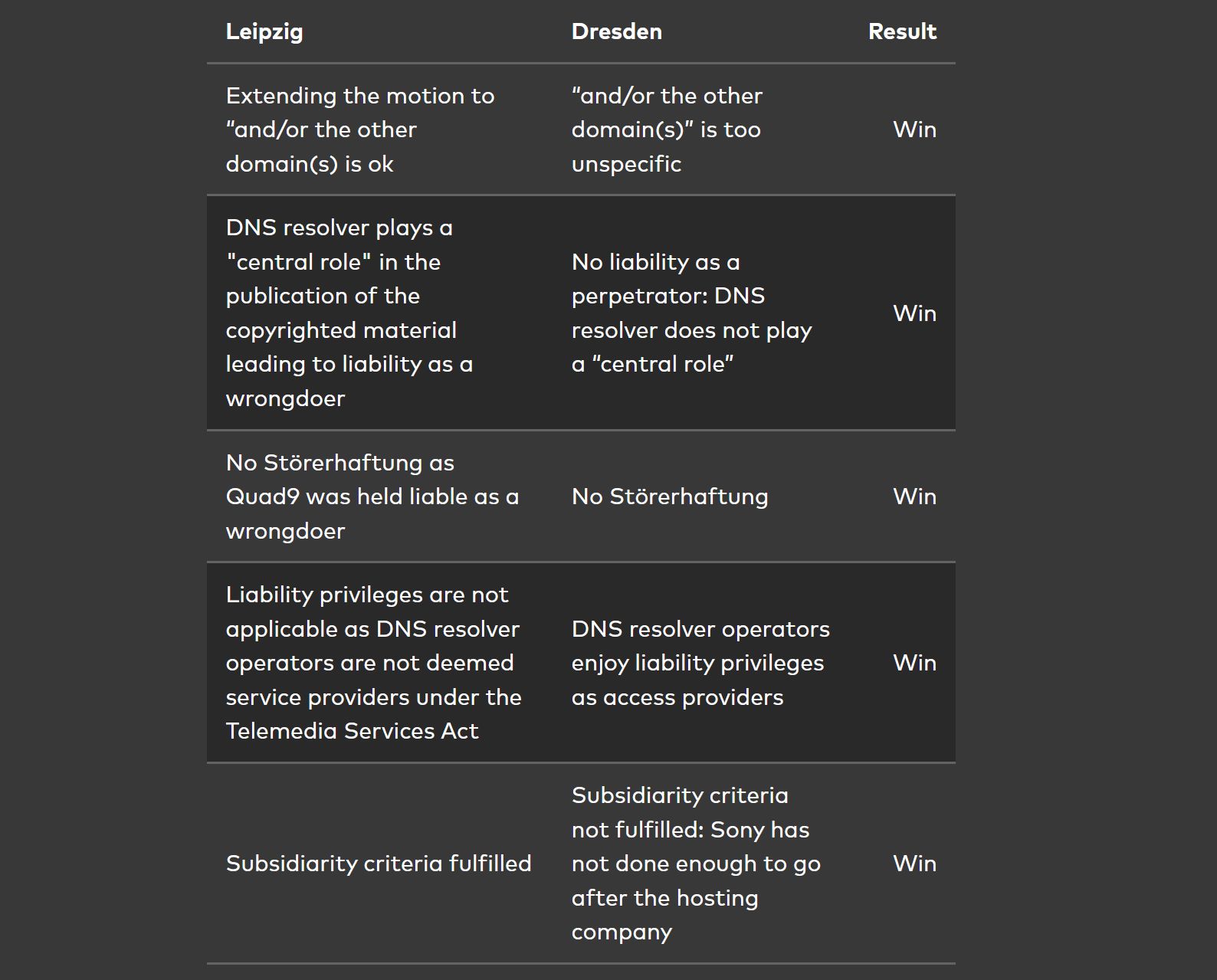 In 2021 , Sony Music obtained an injunction that ordered DNS resolver Quad9 to block a popular pirate site.
In 2021 , Sony Music obtained an injunction that ordered DNS resolver Quad9 to block a popular pirate site.
The injunction, issued by the District Court of Hamburg, required the Swiss DNS resolver to block access to a site that links to pirated music.
The name of the targeted site initially remained a mystery, but we deduced that Canna.to was the target. That site was, not coincidentally, also targeted by a voluntary blocking agreement previously signed by rightsholders and ISPs.
The music groups presumably targeted the site to prevent people from circumventing the ISP blockades. However, the non-profit Quad9 Foundation was not happy with this far-reaching measure and fiercely opposed the injunction.
The DNS resolver stressed that it doesn’t condone piracy but believes that enforcing blocking measures through third-party intermediaries, that don’t host any content, is a step too far.
This initial objection failed; the Regional Court in Hamburg upheld the blocking injunction. However, the case continued at the Higher Regional Court in Dresden where Quad9 managed to turn the case around.
Quad9 Books Key Victory in Court
The Higher Regional Court ultimately concludes that DNS resolvers can’t be held liable under German and European law. These services are neutral intermediaries and don’t play a “central role” in the copyright-infringing activities of pirate sites.
The court stresses that the DNS resolver doesn’t host any pirated content and its users don’t make copyright-infringing content available either. DNS resolvers simply translate a domain name request to an IP-address.
“[Quad9] does not initiate this transmission, nor does it select the addressee and the content of the information. It plays a less central role than those who have committed the infringement themselves (site operator) or have contributed to it by providing services (hosting provider),” the court writes (translated).
“The users of [Quad9] do not make infringing content publicly available but at best request it. The defendant does not store this content. It doesn’t transmit such content, but only the domain request of a user and the IP address of the server on which this content may be stored.”
Since Quad9 doesn’t play a “central role” in the copyright infringing activities it can’t be held liable. As a result, it can’t be ordered by an injunction to block access to the pirate site.

The public DNS resolver is pleased with the outcome and immediately removed all blocking measures on its system. This means that all domains of CannaPower, also dubbed the “Queen of Music Warez”, are available globally once again.
“Today marks a bright moment in the efforts to keep the internet a neutral and trusted resource for everyone,” Quad9 writes while thanking all supporters of its legal efforts.

This is the second order of this kind in Germany this fall. Previously, the Higher Regional Court of Cologne concluded that Cloudflare doesn’t have to take any measures on its public DNS resolver in response to copyright complaints, as the service operates in a purely passive, automatic, and neutral manner.
Trouble Ahead in Italy
The Dresden court stressed that its decision is final, which means the case cannot go to a higher court. This limits Sony’s options to appeal the verdict. However, the trouble for Quad9 isn’t over yet.
Over in Italy, Sony Music Italy, Universal Music Italy, Warner Music Italy, and the Italian Music Industry Federation, have recently requested similar DNS blocking measures from Quad9.
The music companies haven’t filed a lawsuit yet but want the DNS provider to ban the domain names of three torrent sites: LimeTorrents, KickassTorrents, and Ilcorsaronero. These three targets were not chosen at random. An Italian court previously ordered Cloudflare’s DNS resolver to block the same domain names.
Quad9 is determined to fight this blocking request in Italy, but it first wants to make sure that the German case is final. In the meantime, the DNS resolver has complied with the Italian request by blocking the aforementioned torrent sites globally.
—
A copy of the order from the Higher Regional Court in Dresden is available here (German, pdf) and a machine-translated English copy can be found here (pdf)
From: TF, for the latest news on copyright battles, piracy and more.
0 Commentaires